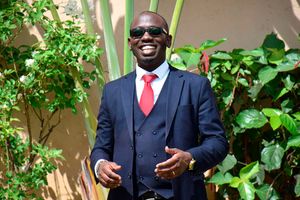Premium
Residents hope Sh2 billion dam will quench their thirst

The Badasa-Songa dam being constructed in Mt Marsabit. Photo/PHOEBE OKALL
Very few investors in the hotel industry would risk putting money into Marsabit Town, for the sole reason that water is a very scarce commodity.
The shortage is so serious that children are sometimes forced to drop out of school to fetch water for their homes and for livestock.
They have to troop around the few available taps or around bowsers. And it may take the whole day to fill their jerricans due to long queues.
So, the people of Marsabit have been waiting for completion of a Sh2.349 billion dam with great enthusiasm.
Once it is completed, Badasa-Songa Dam will end the perennial water problem in Marsabit Town —the county’s headquarters and open it up to investment.
The dam being built the heart of Mt Marsabit has a capacity of five billion litres when full.
According to Mr Said Shute, managing director of Midroc Water Drilling Company, which is building the dam, the reservoir can sustain the community in Marsabit Town and its surroundings for three years.
“This is when people are using the water for domestic purposes and for their livestock as well as industrial use, but not irrigation,” he explained.
The dam is 10 kilometres from the town and Mr Shute said water will be pumped from the treatment works to two storage tanks at the top of the mountain.
The two tanks with a capacity of 3.2 million litres will be supplying clean water to Marsabit Town through gravity.
Currently the town’s water comes from Bakuli spring, which is also at the top of the mountain but it has almost dried up following degradation of the forest.
Since it is not enough for the population, the rest is fetched from boreholes in Logologo – 50 kilometres away.
The town has to rely on tankers for its water.
The dam was started in December 2009 and is supposed to be complete by December this year.
However, Mr Shute admitted that they could not meet the deadline.
“During construction we have found several hollows or vacuums underneath since Marsabit area is volcanic. We also found large boulders, which left big open spaces, and refilling them is what has caused the delay,” he said.
So far, 60 per cent of the money for the project has been used in refilling the open spaces; money not factored into the project.
The project has encountered several other problems, especially from the local community which has been expressing doubts about whether it will ever be filled with water.
Marsabit is a dry area and for the last three years there have been no rains.
Some believe the dam might turn out to be another white elephant. Mr Shute and site engineer Francis Mwaura do not believe so.
They said the site had been surveyed by Government engineers in 1981.




